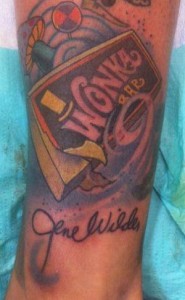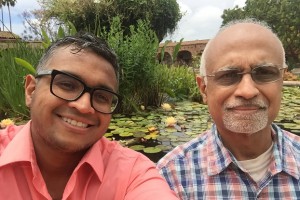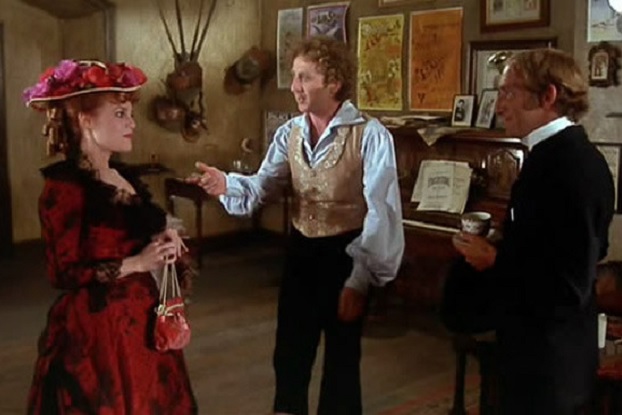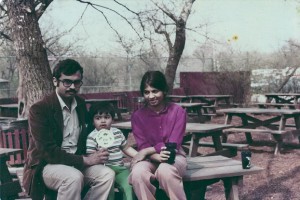
“Kings will be crowned, and the word goes around,
From father to son, to son” — Queen
I met Gene Wilder in 2010 during a book festival at the Marcus Jewish Community Center in Dunwoody, Georgia. Not only did I get to sit on stage with a select group of fans, but I was also lucky enough to join the same group when we serenaded him with “Pure Imagination.” After his talk, I stood in line, shook his hand, and got my copy of one of his books autographed.

I turned the Wilder autograph into a tattoo. The autographed book, however, became a present to my dad, Dr. K. Sriram, for Father’s Day.
As I reflect on the first anniversary of the entertainer’s death, no single person better represented my childhood dreams than Gene Wilder, whose films and characters were magical, whimsical, touching, and part of the bond that unites me and my father. Movies are a big part of my family’s interests, particularly on my paternal side, and movie-watching, especially at the “cinema” was something pivotal to my father’s childhood in Chennai (Madras) in the 1950s and 1960s.
While he grew up in an independent India, it became a ritual for my dad, his two brothers, and his parents to visit the cinema frequently to see the latest British (and American) movies. When I lived in India from age nine to 17, I saw a lot of movies with my paternal grandfather, Dr. P. Krishnan (or “PK” for short). To this day, when I see a particularly British film — like The English Patient (1996), Atonement (2007), or Dunkirk (2017) — I think of him and wish he was around to see it with me.

My dad must have known early on that if he had children, he would pass on his love for movies to them, and he did indeed. My childhood in Illinois could only be described as idyllic and besides the punctuation of trips to India or grandparents coming to stay with us, I often think about it in terms of pop culture. The Muppet Show, Sesame Street, and 3-2-1 Contact were always on, but it was the films of Gene Wilder that became the “soundtrack” or frequent reference point for guaranteed giggles in my house.
Wilder was American, not British, though it would be hard to tell from his films where he either adopted an Eastern European accent — Young Frankenstein (1974) and The Frisco Kid (1979) — or which were set in locales that could have been anywhere like Willy Wonka & the Chocolate Factory (1971). One Wilder vehicle in particular became a family film favorite — The Adventure of Sherlock Holmes’ Smarter Brother (1975). To call this film silly would be an understatement; it was an absurd and farcical reinvention of the detective oeuvre, with a focus not on the famous detective, but on his alleged younger brother, Sigerson, who in one scene, contemptuously refers to his elder brother Sherlock as “Sheer-Luck.”

This strange musical comedy film, set in England, with an American actor playing a British detective and chock-full of references to the original stories by Sir Arthur Conan Doyle, became the unofficial Sriram family movie. Wilder was joined by Madeline Kahn and Marty Feldman, both of whom had just come off of Young Frankenstein, as well as other stalwarts of cinema and theatre including Leo McKern, Roy Kinnear, and Dom DeLuise.
“No single person better represented my childhood dreams than Gene Wilder, whose films and characters were…part of the bond that unites me and my father.”
I have seen it many, many times, as a child and adult, and I believe now that the reason my dad loved it so much, which in turn gave my sister and I an excuse to also love it, was because Gene Wilder was such a gentleman. I was obviously too young for Wilder’s more ribald adventures with Richard Pryor, but one thing that seemed to course through all of his roles was a lack of explicit or graphic sexuality and cursing — even when he went as far as falling in love with a sheep in Everything You Always Wanted to Know about Sex* (*But Were Afraid to Ask) (1972).

Can we ever truly repay our parents, knowing as I do now that the sacrifices they made — as well as the supreme patience they must have had to put up with our bullsh*t — all came from a higher place that extended beyond mere duty? This question is only compounded for the children of immigrants who understand the risks and fears associated with leaving the country of one’s birth to take a chance at a new life and the sheer bravery that must have taken. It’s almost like I knew their struggle was difficult, but it took seeing The Namesake (2006) for me to really put it all in perspective. How do we tell our parents we love them when we grow up without public displays of affection? I didn’t even see my parents hold hands till I was 28!
Which brings me back to Gene Wilder. Despite the challenges it took for my mother and father to acclimatize themselves to the whole new world that would have been Chicago in the 1970s, I had the most amazing childhood. For that first ten years of my life (1979 to 1989) when I called Illinois home, before we all moved “back” to Chennai, I had the kind of youth that others might look at it envy. It was full of every possible type of fun and I never wanted for affection. The glue that kept it together and created a bond between father and son was the gentleness and sensitivity of perhaps the most underrated comic genius ever, Gene Wilder. Rest in peace, sir.
* * *
Shyam Sriram is a Ph.D. student in the department of political science at the University of California, Santa Barbara. His primary area of focus is Asian Pacific American politics, but he also works on the political attitudes of refugees.












